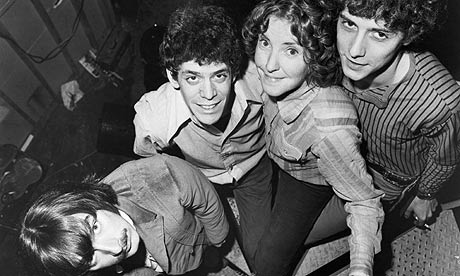According to the director of a daring new movie about Nico, the most notable aspects of the late singer’s life had nothing to do with the Velvet Underground, Andy Warhol, or her glamorous roles as model and muse. “Most people think that after her experience with the Velvet Underground and the Factory, Nico simply ‘became a fat junkie’ and disappeared,” said Susanna Nicchiarelli. “But to me, the second part of her life is so much more interesting than the first. That’s when she really became herself.”
Not that it’s an entirely pleasant, fair or rational person that she became. That’s made clear in Nico 1988, which makes its US debut this week at the Tribeca film festival before a summer release. Unlike every previous dramatic portrayal of the star, which focused on her Dolce Vita years, when she attracted lovers from Jim Morrison to Jackson Browne to Alain Delon, Nico 1988 chronicles the final two, uncelebrated years of life. By then, she was an addict, shooting heroin into whatever covert part of her body she hadn’t yet poked. Nico was also overweight and, sometimes, malodorous. “I very rarely take showers,” her character boasts in the film.
As a personality, Nico is often portrayed in the movie as obstinate, self-involved, paranoid and reckless. But she also displays a punky defiance and she had enough focus to create some of the most unusual, important andmost personal music in her career, on solo albums like The Marble Index, Desertshore and The End. At her concerts in the 80s, several of which I caught in New York, Nico exuded a morbidity so transfixing it later inspired some observers to cite her as the first goth, presaging artistic ghouls from Siouxsie Sioux to Bauhaus. As portrayed in the film, Nico also possessed an inner life as strange and haunted as her music. It’s captured in exquisite detail by the Danish actor Trine Dyrholm, who plays the star and sings all of her songs. Though she neither looks like nor sounds exactly like Nico, she nails her sad and dreamy core.
Finding the right approach for the vocals proved tricky. The clumsiness of Nico’s singing meant that recreating it precisely could have seemed like a satire. Somehow Dyrholm found a sweet spot between accuracy and invention – as well as between sincerity and irony. “When she sang, Nico was often out of tune, and sometimes she sounded really awful,” Dyrholm said. “But that doesn’t matter. She told a story in her songs. I viewed her songs as monologues to capture the emotional state of the character.”
Her state often reflected a hard past. The movie opens with a scene of a young Nico watching her city, Berlin, burn at the end of the second world war. “She was old enough at the time to understand what the defeat of her country meant,” Nicchiarelli said. “She grew up in terrible conditions. She suffered hunger. That was something that shaped her character.”
Nico also struggled with guilt over her father’s role in the war. She often lied about his circumstances, falsely reporting to many that he helped rescue Jews. “It’s interesting that Nico was born in 1938 and died in 1988, a year before the end of the cold war,” Nicchiarelli said. “She never saw her country reunified. It’s as if the war never ended for her.”
During much of the time that the film takes place, Nico lived in Manchester, a city she tells a local radio DJ she had chosen because it reminded her of the ruined Berlin. Other parts of the interview demonstrate her frustration with the endless interviewers who only want to know about the Velvet Underground. When the DJ introduces her as “Lou Reed’s femme fatale,” she barks: “Don’t call me that.”
When asked if she wants to talk about the Velvet Underground, she growls: “No, I don’t.” And after the DJ rudely muses that 1968 must have been the best year of her life, she drily sneers: “Well, we took a lot of LSD.”
“I like the fact that she’s not a pleaser,” Dyrholm said. “She’s a no bullshit type.”
At the same time, Dyrholm admits “she’s obviously not likable”. Nicchiarelli calls Nico “infuriating”. Much of the movie follows the singer on the road in Europe, as she tussles with her band, a largely untalented group of misfits. It’s much the same ground covered by the 1993 memoir The End, written by the group’s keyboardist, James Young. While Young’s vivid account couldn’t be more withering, or hilarious, Nicchiarelli takes a more balanced approach. She finds an earnest core for her story by spending key time on Nico’s relationship with her son, Ari, with whom she reunited late in her life. Born out of wedlock, Ari is widely reported to have been fathered by Delon, though the French actor has always denied it. Even so, his parents wound up raising the boy when Nico proved unfit for the task. “I believe the love of her life was Ari,” Nicchiarelli said.
Ari has seen the film and, according to the director, came away greatly impressed by Dyrholm’s interpretation of his mother. Nico suffered significant guilt over her inability to care for her son, blaming herself for the mental health problems he faced, which are harrowingly depicted in the film. The movie also deals with Nico’s battle against her beauty. “She wanted to destroy it,” Dyrholm said. “Imagine being so beautiful that it becomes a burden.”
Nicchiarelli sees in Nico’s rejection of beauty a kind of strength. “While many women and men don’t accept that we change, she dealt with it,” she said. “At the same time, she was very careful about her new look. She always dyed her hair and she always wore makeup, even if it was weird. She would paint her face white.”
Before the end of her life, Nico cleaned up to some degree by switching to methadone. She was staying with Ari in Ibiza when she suffered a cerebral hemorrhage, leading to her death. The music she made in her later years, culminating in 1985’s Camera Obscura, got at something dangerous and deep. “In her music, you can hear that she’s carrying around a knowledge of death,” Dyrholm said. “She had this deep darkness in her but also a really strong energy.”
“Ultimately, what I like about her is that she’s not the cliche of the fragile woman,” Nicchiarelli said. “She knew what she wanted. She wanted to make her own music, and she did it.”
- Nico 1988 is showing at the Tribeca film festival and will be released in the UK on 9 May and in the US in August











